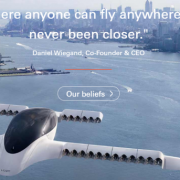Why Your Next Taxi Ride Could Be By Air
San Francisco is 49.2 square miles of pure innovation – at least historically.
The most creative solutions to the world’s most complex problems have been generated from this diminutive peninsula that juts out into the Pacific Ocean.
But when it comes to transportation, and by that, I mean the public transportation efficiently operated in most European and Asian cities like Seoul, Korea and Frankfurt, Germany, San Francisco epically fails at delivering an adequate system to the masses.
Instead, the stopgap solution gave us Uber (UBER), the rideshare company, and the fall out is more cars clogging up a bigger portion of the roadways and bridges.
And then there is Tesla (TSLA), whose enigmatic CEO loves to tell investors that electric is the panacea to the world’s economy.
Is Silicon Valley that far off from solving the conundrum of smooth public transportation by applying technology?
The solution might be percolating in Wessling, Germany by a company named Lilium who developed the Lilium Jet, an electrically powered commuter aircraft capable of vertical taking off and landing (VTOL) flight.
Moving forward, it’s black and white that the answer is 3D and not 2D.
Lilium was founded in 2015 by four engineers and PhD students at the Technical University of Munich.
In 2017, The Lilium Eagle, an unmanned two-seat proof of concept model, performed its initial flight at the airfield Mindelheim-Mattsies near Munich, Germany.
The successful test led the company to launch the 5-seat Lilium Jet and they hope by 2025, to roll out a full-fledged aerial taxi service.
Co-Founder and CEO Daniel Wiegand swears that within five years, a fleet of them could offer a 10-minute trip from Manhattan to Kennedy International Airport for $70.
Expectations that aerial taxis will be a reality in the coming years are quickly skyrocketing.
Companies like Lilium are researching, testing, and laying the groundwork for wider production and hankering for support from government officials.
At least 20 companies have skin in the game, which Morgan Stanley estimates will become a $850 billion market by 2040.
Larry Page, the billionaire co-founder of Google (GOOGL), is financially buttressing Kitty Hawk, a Palo Alto company run by the first engineers on Google’s autonomous car.
Uber is developing an air taxi service, with plans to operate by 2023, but I highly doubt that investors would give the go ahead if the cash burn overwhelms them.
The Federal Aviation Administration (FAA) is another tripwire that could knock the 2025 schedule off kilter and their notorious bureaucratic ways do not infuse certainty into the project.
Can Lilium build a platform that is broadly accessible and efficient?
That answer will be unpacked in the next few years.
The aerial vehicle has a carbon fiber body, 36-foot wingspan, and is battery powered, providing a range of 186 miles and a top speed of nearly 190 mph.
Inside the oblong-shaped cabin, posh seats await four passengers and a pilot.
The aircraft can take off and land vertically like a helicopter and is even quieter than a helicopter.
Once scaled out, production costs will run in the several hundred thousand dollars for each aircraft-making profitability realistic.
There will be lower maintenance costs because there are fewer mechanical components, and rides should cost less than Uber.
If rolled out on a mass scale, cityscapes will be revolutionized.
San Francisco and California effectively could bypass proper land public transport and skip straight to aerial vehicles as taxis.
Lilium’s plane has packed 36 smaller engines in its rotating wings that act as thrusters for takeoffs, landings, and subtle movements forward and back. Encasing the engines in the wings reduces friction and noise.
Lilium’s performance is currently unmatched but its secretive nature of the technology means it’s hard to quantify where they are now in the development.
With the funneling of capital to solve global transportation issues, aerial aspects will definitely be intertwined into the solution.
The race is on to capture the first-mover advantage and my bet it will be Lilium.




